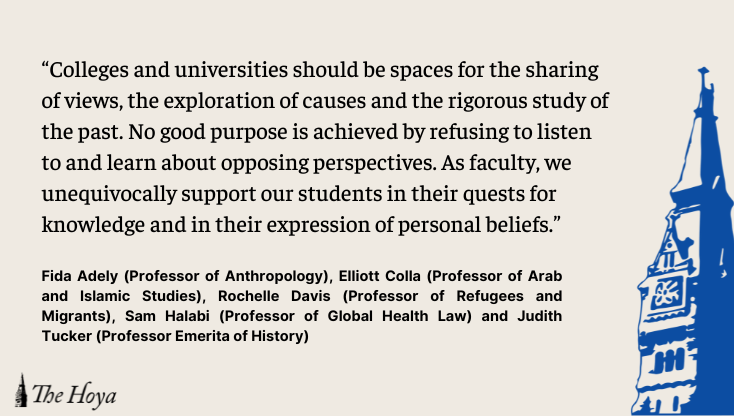Over 60 members of Georgetown University’s faculty have signed a statement calling for an immediate ceasefire in Gaza. The petition also demanded the provision of full humanitarian assistance to civilians who have been under heavy Israeli bombardment over the last several weeks.
The ongoing assault on Gaza is unconscionable.
As of Oct. 31, United Nations statistics put the death toll for Gazans at 8,525 since the start of the conflict — 67% of whom are women and children, according to Gaza’s Ministry of Health. Almost 1,400 Israelis have been killed, and over 200 were kidnapped and taken to Gaza.
At the same time, Israeli officials have been open about their plans to continue pulverizing Gaza. They also announced that they are withholding food, medicine, water and fuel from the civilian population. Night after night and day after day, terror rains down from the skies, and the current Israeli ground invasion is sure to raise the civilian death rate even more dramatically.
We express our grief for all civilian victims of violence, Palestinians and Israelis alike.
As academics, we further take the responsibility to study and understand the root causes of the high human cost of this conflict over time.
The ongoing war has a painful history: the state of Israel, which was formed to address the oppression of Jews in Europe, has, in turn, become an oppressor of an indigenous people. The Israeli state expelled the majority of the Palestinian population in 1948 and has maintained a military occupation in Gaza and the West Bank since 1967.
Major human rights organizations, including Amnesty International, Human Rights Watch and the Israeli human rights group B’Tselem have characterized Israeli rule as one of apartheid.
Coming to terms with the settler-colonial relationship lying at the center of this history will be an important step toward a better future for all people.
We also want to express our concerns about the attacks on freedom of speech and on faculty and students who express opposition to Israeli war crimes and who mourn the deaths of Palestinians.
Across the United States, we have seen blatant attempts by major donors to punish university administrators and students for failing to fully support Israeli attacks or for daring to suggest that Palestinians have rights and claims that lie at the heart of the conflict.
In addition, a number of campuses and other venues have cancelled events that feature Palestinian voices or that even present positive views on Palestinian culture. Even further, photos and articles of university students standing with Palestinians have been the subject of sensationalist media pieces by right-wing outlets and tabloid media.
Colleges and universities should be spaces for the sharing of views, the exploration of causes and the rigorous study of the past. No good purpose is achieved by refusing to listen to and learn about opposing perspectives. As faculty, we unequivocally support our students in their quests for knowledge and in their expression of personal beliefs.
Georgetown has been a model to others on the issue — students, faculty, staff and programs have organized in-person and virtual events aimed at education and understanding, as well as commemoration, support and solidarity.
In the long run, we ask that Georgetown work toward peace and justice in the region. We can engage in acts of solidarity with our counterparts in the West Bank, such as Bethlehem University, Birzeit University and an-Najah National University, by way of student study abroad, faculty exchanges and other forms of shared programming.
For example, Bethlehem University is a Catholic Lasallian university that has sent two student interns to Georgetown in the past. We have joint foundations like this to build upon.
It is not enough to condemn violence; we must also recognize the importance of collaborating with our Palestinian and Israeli colleagues in their calls for nonviolent resistance –– most notably in the form of the Boycott, Divestment and Sanctions movement that is modeled after the set of actions that helped to end apartheid in South Africa.
The tragic situation in the region cannot be resolved by brute force. It is only through a full and honest examination of the root causes of the conflict and the assertion of the equal rights of the indigenous Palestinian people that we can secure a decent future for all in the region.
Fida Adely is a professor in the School of Foreign Service and the Director of the Center for Contemporary Arab Studies.
Elliott Colla is a professor in the College of Arts and Sciences.
Rochelle Davis is a professor in the School of Foreign Service.
Sam Halabi is a professor in the School of Health.
Judith Tucker is a professor emerita in the College of Arts and Sciences.















Larry • Nov 20, 2023 at 7:25 pm
It is refreshing and gives hope to see all of you pen this view. I hope Georgetown administration reads and accepts your collective premise. I do not hold much hope you will get support from the university administration. President DeGioia has shown his administration’s seeming infatuation with Washington politicians and bureaucrats by bringing them the Georgetown to campaign. And Georgetown needs to work on its reputation for free speech. Its not looking to good. Seldom does an issue have one perspective, yet DeGioia and his staff seem to situate in a position that gives them the best optics for those with the most money. That applies across the board, not just about what is happening in Israel and Gaza. Maybe its time for a change.